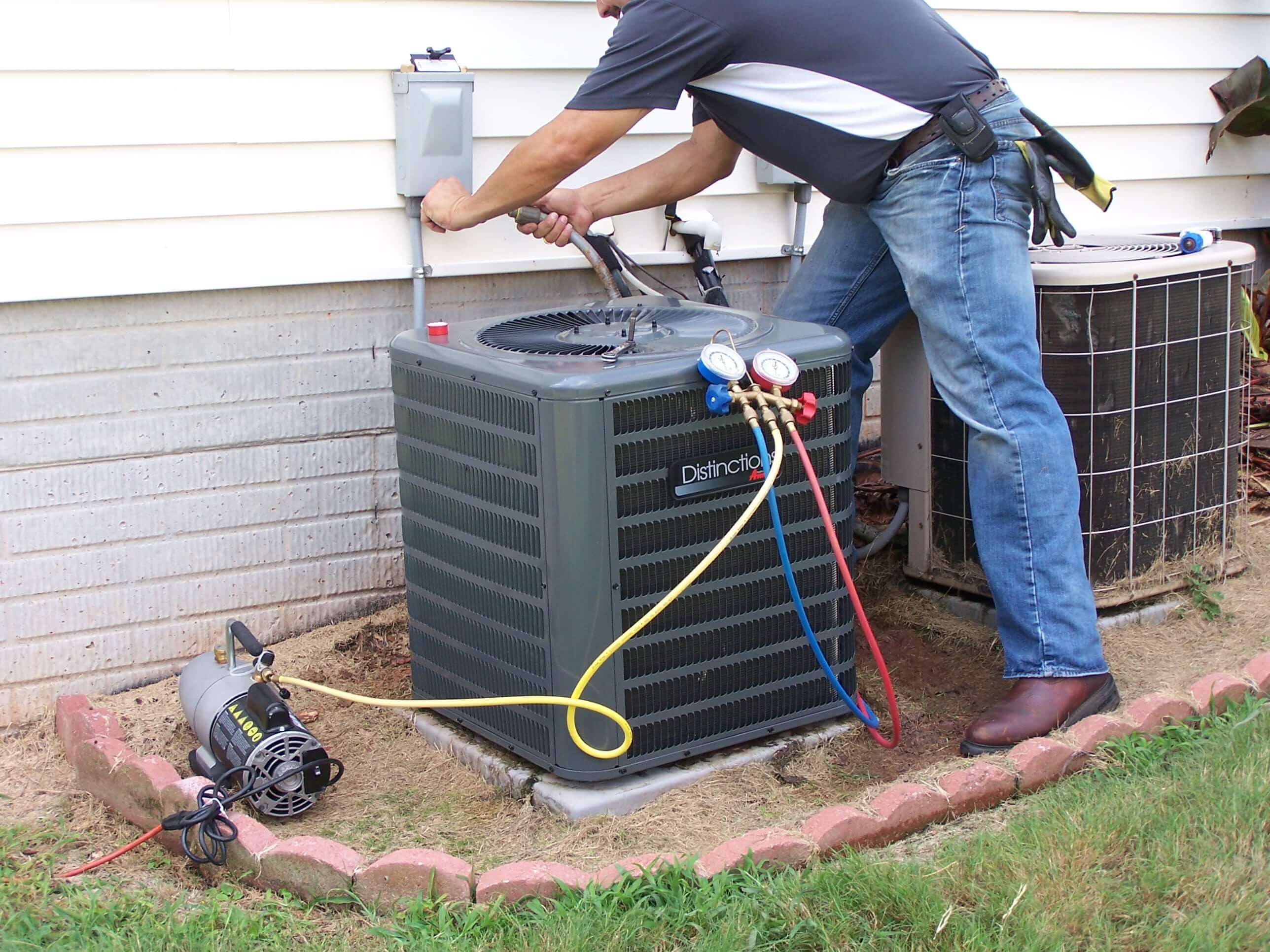The Top Signs Your Air Conditioner Needs Immediate Repair
The Scientific research of Cool: How Air Conditioners Work ==========================================================
Envision your ac system as a master carver, skillfully chiseling away at the overbearing warmth in your house, leaving behind a great, comfy sanctuary. Have you ever before questioned how this modern wonder accomplishes such an accomplishment?
The complex dancing of refrigerants, coils, compressors, and ducts all operate in harmony to create that stimulating blast of cool air. But exactly how precisely do these components come together to develop that much-needed respite from the blistering warm?
Allow's discover the internal functions of air conditioning unit and debunk the scientific research behind staying cool.

Key Takeaways
- Reliable ACs make use of cooling agents to soak up and launch warm, enhancing cooling and energy efficiency.
- Normal maintenance guarantees optimal efficiency, longevity, and energy cost savings.
- Proper sizing and layout prevent energy waste and guarantee even cooling circulation.
- Recognizing airflow dynamics and optimization boosts cooling performance and convenience levels.
The Fundamentals of Cooling
Understanding the principles of cooling can significantly boost your understanding of exactly how these systems run successfully. Energy effectiveness is a critical facet of a/c, as it not only impacts your electricity costs but also the setting. Efficient a/c utilize less energy to cool a space, making them cost-efficient and environmentally friendly. By buying an energy-efficient device, you can take pleasure in a comfy indoor environment while decreasing your carbon impact.
Humidity control is one more vital feature of a/c. Ac system assist control the dampness degrees in your house, creating an extra comfortable ambience. Excess moisture can bring about mold growth and pain, while reduced moisture levels can create completely dry skin and respiratory system problems. A well-kept a/c can effectively manage humidity, making sure a healthy and positive living atmosphere for you and your household.
Recognizing how a/c systems take care of power efficiency and moisture control can help you make informed decisions when picking and using these systems in your home.
Recognizing Refrigerants and Their Role
When it involves ac system, understanding cooling agents and their function is very important. You'll find out about the importance of refrigerants in cooling down systems and how they facilitate the heat transfer process.
Furthermore, taking into consideration the environmental effect of cooling agents is vital for sustainable air conditioning services.
Function of Refrigerants
Cooling agents play a crucial duty in the procedure of ac unit by facilitating the transfer of warm. The effectiveness of a refrigerant straight influences the cooling procedure and power consumption of the system.
When considering cooling agents, it's vital to weigh their performance versus their environmental effects. Some refrigerants contribute to ozone deficiency and global warming, prompting the search for greener choices. Sustainable measures focus on finding cooling agent options that are energy-efficient and have very little environmental effect.
Suppliers are progressively purchasing creating new refrigerants that align with sustainability objectives. By focusing on cooling agent effectiveness and exploring sustainable options, the air conditioning industry aims to lower its carbon footprint and lessen environmental damage.
Environmental Effect Considerations
Considering the environmental impact of cooling agents is important in evaluating the sustainability of a/c systems. When examining the ecological implications of air conditioning unit, 2 key variables to take into account are energy effectiveness requirements and carbon impact analysis. Latest air conditioning technology
- Power Effectiveness Requirements:
Energy-efficient a/c consume much less electricity, decreasing general power consumption and environmental effect.
Carbon Footprint Analysis:
Performing a carbon impact analysis helps in understanding the amount of greenhouse gas discharges associated with a/c operations.
Cooling agent Selection:
Selecting cooling agents with lower Global Warming Potential (GWP) can significantly decrease the ecological impact.
Correct Disposal:
Making certain appropriate disposal of old cooling agents avoids them from harming the environment.
Regular Upkeep:
Normal maintenance of a/c systems can enhance efficiency, lowering power usage and ecological influence.
The Refine of Heat Transfer
When your a/c operates, it depends on a procedure of warmth transfer to cool your space efficiently. This system entails the absorption of warm from the indoor air and the exchange of thermal energy to maintain a comfortable temperature level.
Understanding this crucial facet assists you grasp just how a/c efficiently regulate the environment in your home.
Heat Absorption System
To effectively cool down the air in your space, air conditioners employ a warm absorption mechanism that effectively transfers warm. This system plays an essential duty in maintaining temperature guideline and utilizing advanced cooling innovation.
Below's just how the warmth absorption procedure works:
- Cooling agent Blood circulation: The cooling agent takes in heat from the indoor air.
- Compression: The compressor increases the pressure of the cooling agent, causing its temperature level to increase.
- Condensation: The warm, pressurized refrigerant releases warm outside as it condenses right into a fluid.
- Growth Shutoff: This component decreases the refrigerant stress, causing it to cool down and vaporize.
- Evaporation: As the cooling agent vaporizes, it takes in heat from the interior air, starting the cycle over again.
Thermal Energy Exchange
In the procedure of thermal energy exchange, warmth transfer plays a crucial role in exactly how a/c unit work to cool down indoor rooms successfully. Thermal characteristics determine that warmth constantly flows from a warmer location to a cooler one. Air conditioners utilize this principle by drawing out warm from indoor air and releasing it outside, utilizing refrigerants to help with the transfer.

Reliable thermal energy exchange is vital for the power efficiency of a cooling system. By optimizing warmth transfer procedures, air conditioners can cool spaces efficiently while lessening power intake. Recognizing the characteristics of warm transfer is important for designing and operating ac unit that offer the desired level of comfort without unnecessary power waste.
Evaporator Coils and Their Feature
Recognizing the function of evaporator coils is vital to realizing how a/c unit efficiently cool indoor spaces. These coils play an essential role in the cooling process by taking in heat from the interior air, which is then distributed back as awesome air.
Here are some bottom lines concerning evaporator coils:
- Evaporator coil performance directly influences the cooling efficiency of the air conditioning system.
- These coils contain refrigerant that vaporizes as it soaks up warm from the indoor air.
 * As the refrigerant evaporates, it changes from a liquid state to a gas, cooling down the air at the same time.
* As the refrigerant evaporates, it changes from a liquid state to a gas, cooling down the air at the same time. - The cooled air is after that dispersed throughout the area via the air ducts.
- Proper maintenance of the evaporator coils, such as regular cleaning, is vital to ensure top performance and energy performance.
Compressor and Condenser Workflow
Effectively cooling down indoor areas includes recognizing how the compressor and condenser interact in an a/c system. The compressor plays an essential role in the cooling procedure by pressurizing the refrigerant gas, increasing its temperature and energy degree. This high-energy gas after that flows to the condenser, where it launches warmth to the surrounding atmosphere, creating it to condense right into a high-pressure fluid.
The condenser further cools this liquid through heat exchange with the outside air, transforming it back right into a low-pressure gas. This process boosts power effectiveness and boosts the system's cooling power. Temperature level law is achieved as the cooling agent cycles through these system elements, soaking up heat indoors and launching it outdoors.
Air Ducts and Air Distribution
To enhance airflow and guarantee consistent cooling throughout your space, correct setup and upkeep of air ducts are important. Making certain that your duct are designed successfully and in a way that promotes ideal air movement dynamics is important for the general efficiency of your cooling system. Air flow approaches play a considerable function in maintaining interior convenience levels, so it's important to take note of the following:
Air duct Style: Correctly designed air ducts help ensure that amazing air gets to every corner of your space effectively.
Airflow Characteristics: Recognizing exactly how air steps with the air ducts can help you identify any type of potential problems that may disrupt the cooling procedure.
Normal Upkeep: Maintaining your duct tidy and devoid of blockages is crucial for preserving air flow and system efficiency.
Securing Leakages: Making certain that there are no leaks in your ductwork helps avoid trendy air from getting away, boosting energy efficiency.
Balancing Air flow: Appropriately stabilizing the air movement in different areas can aid keep regular cooling throughout your home or office.
Regularly Asked Questions
Just how Does the Dimension of an A/c Unit Affect Its Effectiveness and Air Conditioning Ability?
When selecting an air conditioner, keep in mind that size issues. A system that's also small might have a hard time to cool your area successfully, while a large one could throw away energy and not evaporate appropriately. HVAC duct repair Ensuring appropriate sizing considerations will improve performance and air conditioning capacity.
The right dimension directly impacts efficiency, helping you stay comfy without unneeded prices. So, when it comes to ac unit, remember size for finest performance and cooling power.
What Are Some Typical Maintenance Tasks That Can Assist Enhance the Life-span of an Air Conditioning Unit?
Normal upkeep jobs can greatly expand the life of your a/c. Keep in mind to replace filters to ensure proper air movement and clean coils to improve cooling performance.
Furthermore, adjust your thermostat for precise temperature readings and examine the cooling agent degrees for finest performance.
Can Air Conditioners Be Made Use Of along with Other Cooling Methods, Such as Fans or Dehumidifiers?
Yes, you can enhance your cooling experience by combining your ac system with fans. This cooperation can aid circulate trendy air better, offering an extra comfy setting and potentially saving power.
Furthermore, making use of a dehumidifier together with your ac system can increase cooling effectiveness by decreasing moisture degrees, making your space feel cooler.
Think about these alternatives to optimize your cooling setup and boost your general comfort throughout warm days.
Exist Any Environmental Problems Connected With the Use of Air Conditioners, and How Can They Be Mitigated?
When using ac system, bear in mind ecological worries like power intake and greenhouse gas discharges.
To minimize these concerns, take into consideration sustainable cooling methods and green choices.
You can lower the impact of ac system by utilizing energy-efficient versions, preserving them on a regular basis, and integrating other cooling down techniques like followers or dehumidifiers.
What Advancements Are Being Made in Air Conditioning Technology to Make Systems Much More Energy-Efficient and Eco-friendly?
To make air conditioners more energy-efficient and eco-friendly, advancements like wise modern technology and environment-friendly attributes are being created. These developments concentrate on increasing power savings and minimizing environmental influence.
By including smart modern technology, air conditioning units can optimize performance based on use patterns. Making use of environmentally friendly materials and elements also contributes to making these systems more sustainable.
These advancements aim to improve performance while reducing the ecological impact of cooling innovation.
Verdict
So, now you understand exactly how a/c work!
From the refrigerants circulating with the system to the warm transfer process, each part plays a necessary duty in keeping you cool down.
The evaporator coils soak up heat, the compressor and condenser release it, and the air ducts disperse the trendy air throughout your area.
Next time you turn on your a/c, remember the scientific research behind all of it! Remain amazing!